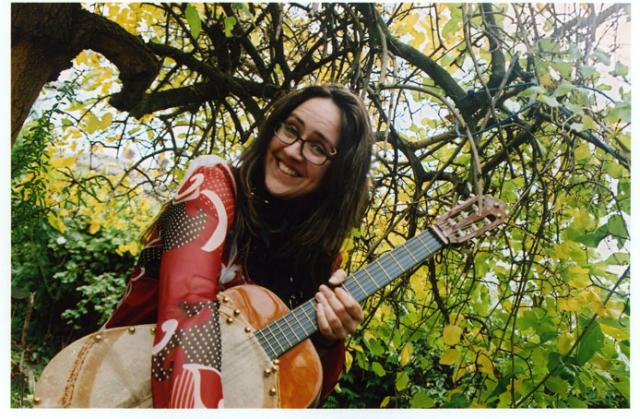
In this AU Review feature, Philippe Perez talks to a couple of Australian music teachers, Rosalind Chia and Tao Kahn (pictured above) and delves into what makes for a good student-teacher relationship musically.
There’s normally a process of many years to plug through to become be a master of any instrument. Practice makes perfect, as the cliche goes. Guitar players like John Butler pluck with furious veracity that may take years to perfect. The three-piece punk band playing two chord songs lasting one minute also need to perfect their craft (that depends on what punk bands describe as perfection though, which is a debatable point).
Regardless, most musicians have, at some point in their career, a learning process, which more often than not, requires a teacher to guide them. It normally happens at the beginning of a career, but there’s never any true path for a music student, and many have sought the experience of a music teacher after an amount of time with an instrument.
Rosalind Chia, a music teacher based in Lithgow in New South Wales is one teacher who helps out in this aspect later in a musician’s life. Along with aural skills, theory, piano, voice and guitar she also is keen to ‘teach performance [and] stagecraft for singer-songwriters who want to be more confident on stage’.
While there is a teachable way to gain that confidence, Chia mentions that there definitely needs to be pleasure on both sides in the teaching process. ‘I think you have to really enjoy teaching and enjoy the company of your niche of students, whether they be children, young adults or mature adults. You have to be prepared to have empathy and to understand how their minds work at their level of development.’
For Chia, there is a strategic method to getting information to who she teaches ‘I teach teenaged and adult students, so I like to find out how they best absorb information and skills as quickly as I can so that I can work out an individualised system that really works for that person. Often – especially with younger adults – they actually just need structure and discipline… which is pretty easy to spot and address.’
It amazes her how some fellow teachers don’t appreciate that teaching process however. ‘You’d be surprised how many teachers there are out there who outwardly admit to a fundamental dislike of teaching and of young people. I’m always like, “What the heck are you even doing in this job?”’
The story of Tao Kahn reflects that the passion for learning an instrument and also teaching music is an amazing and weird experience, considering she attributes the steady growth of students over the years to a video game. She isn’t surprised however after thinking about it, however.
‘I initially had about 40 students, and through word of mouth this grew to 80 students over the next two years. At that time, there seemed to be a significant surge in the number of students interested in taking up an instrument, and I believe…Guitar Hero had a lot to do with that. I’ve heard people say negative things about the impact of Guitar Hero on actual playing ability, but that doesn’t make any sense to me whatsoever.
‘If you’re after a high score in the game, you have to be able sync your left and right hand movements in perfect time with the music, which is a key skill for anyone who ever wants to play along with other people, whether your guitar is plastic and plugged into a console, or the real deal into an amp!’
Based in Melbourne, Rock School is Kahn’s home now for all those students. Her commitment to teaching so many people would never waiver however. ‘My student numbers haven’t dropped below sixty since [I began the school]. I’ve never advertised – yet. The interest in learning music clearly remains consistent, as does the power of word-of-mouth. Approximately 50% of my students have been attending lessons for most, if not all, of the 6+ years that I’ve been teaching.’
With her website still under construction, she is hopeful that, once it’s done, itwill drive more students her way. Will her student numbers rise again? ‘You can never know what the future holds’.She understands that those who attend will get other priorities in life however, and that due to many circumstances, no everyone will become a master in their craft of music. It’s a normal story a lot of the time, and potential musicians find that talent can ride a fine line between natural or learned ability. Patience therefore is a virtue that is highly valued.
Rosalind Chia is an advocate of enjoying yourself while learning, and thinks it’s the key to enjoying playing music long term. ‘I think you have to really enjoy teaching and enjoy the company of your niche of students, whether they be children, young adults or mature adults. You have to be prepared to have empathy and to understand how their minds work at their level of development.’
‘A great music student is there because they want to be there and because they love music. Everything after that is secondary.’
Kahn espouses a similar ethic as well about teaching students ‘Being a great music student essentially requires the same things it takes to be a great learner in any context. First and foremost is the desire to learn but also the willingness to take on challenges with patience and positivity. To be blunt, we all suck at some things we tackle along the way, but as I tell students, if they practice enough, they can count on getting good.’
You can find more about Rosalind Chia via Facebook or via Bandcamp
Videos of students at Tao Kahn’s Rock School can be found at their YouTube channel. A website is currently under construction, but can be found here when it’s up and running.
———-
